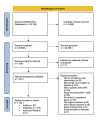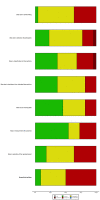A systematic review of acute and emergency care interventions for adolescents and adults with severe acute respiratory infections including COVID-19 in low- and middle-income countries
- PMID: 36342777
- PMCID: PMC9639745
- DOI: 10.7189/jogh.12.05039
A systematic review of acute and emergency care interventions for adolescents and adults with severe acute respiratory infections including COVID-19 in low- and middle-income countries
Abstract
Background: Severe acute respiratory infections (SARIs) remain a leading cause of death globally, particularly in low- and middle-income countries (LMICs). Early intervention is critical, considering the potential for rapid decompensation in patients with SARIs. We aimed to evaluate the impact of acute and emergency care interventions on improving clinical outcomes in patients >10 years old with SARIs in LMICs.
Methods: A systematic literature search was performed in PubMed, Global Health, and Global Index Medicus databases to identify peer-reviewed studies containing SARI, LMICs, and emergency care interventions. Studies published prior to November 2020 focusing on patients >10 years old were included. A narrative synthesis was performed due to the heterogeneity of identified articles. Risk of bias was assessed using the Risk of Bias 2 and Risk of Bias In Non-Randomized Studies of Interventions tools.
Results: 20 223 studies were screened and 58 met the inclusion criteria. Thirty-four studies focused on coronavirus-2019 (COVID-19), 15 on pneumonia, seven on influenza, one study on severe acute respiratory syndrome, and one on undifferentiated SARI. Few COVID-19 studies found a benefit of the tested intervention on clinical status, mortality, or hospital length-of-stay. Little to no benefit was found for azithromycin, convalescent plasma, or zinc, and potential harm was found for hydroxychloroquine/chloroquine. There was mixed evidence for immunomodulators, traditional Chinese medicine, and corticosteroids among COVID-19 studies, with notable confounding due to a lack of consistency of control group treatments. Neuraminidase inhibitor antivirals for influenza had the highest quality of evidence for shortening symptom duration and decreasing disease severity.
Conclusions: We found few interventions for SARIs in LMICs with have high-quality evidence for improving clinical outcomes. None of the included studies evaluated non-pharmacologic interventions or were conducted in low-income countries. Further studies evaluating the impact of antivirals, immunomodulators, corticosteroids, and non-pharmacologic interventions for SARIs in LMICs are urgently needed.
Registration: PROSPERO registration number: CRD42020216117.
Copyright © 2022 by the Journal of Global Health. All rights reserved.
Conflict of interest statement
Disclosure of interest: The authors completed the ICMJE Disclosure of Interest Form (available upon request from the corresponding author) and disclose no relevant interests.
Figures



References
-
- World Health Organization. The top 10 causes of death. [Accessed: 2021 Dec 9]. Available: https://www.who.int/news-room/fact-sheets/detail/the-top-10-causes-of-death
-
- Troeger C, Blacker B, Khalil IA, Rao PC, Cao J, Zimsen SRM, et al. Estimates of the global, regional, and national morbidity, mortality, and aetiologies of lower respiratory infections in 195 countries, 1990–2016: a systematic analysis for the Global Burden of Disease Study 2016. Lancet Infect Dis. 2018;18:1191-210. http://www.thelancet.com/article/S1473309918303104/fulltext. 10.1016/S1473-3099(18)30310-4 - DOI - PMC - PubMed
Publication types
MeSH terms
Substances
LinkOut - more resources
Full Text Sources
Medical
Miscellaneous
